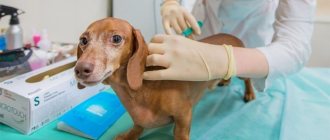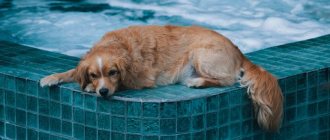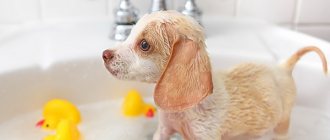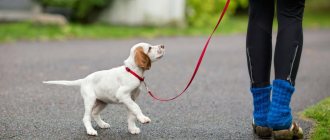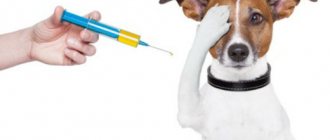At first glance, vaccination is a fairly simple and painless procedure that lasts a matter of seconds. But in fact, after vaccination, a dog requires special care. The fact is that vaccination is the forced introduction of pathogens of various diseases into the animal’s body. The body begins to fight the foreign virus, developing immunity to a particular disease.
Be sure to finish reading this material, because at the end you will find video instructions on how to care for your dog after vaccination.
Since the dog’s body is greatly weakened after vaccination, it is easily susceptible to various infections, and it will take time to regain strength. To ensure that your animal does not experience any complications after vaccination, it is important to follow a number of simple rules.
Preparing your dog for vaccination
Since vaccination is the introduction of live but weakened strains of microbes and viruses into the body in order to induce immunity to diseases, it should only be carried out on a completely healthy animal that has been treated for parasites (worms and fleas). Worms weaken the four-legged immune system. Therefore, it is important to deworm the animal 10-14 days before vaccination.
Currently, veterinarians recommend the following drugs for helminthiasis: Milbemax, Kanikvantel plus, Drontal. When using, the manufacturer's instructions should be strictly followed. To avoid addiction, it is recommended to change medications periodically.
If after helminthization the parasites have not disappeared, vaccination should be postponed and the animal should be re-treated for worms (according to the instructions for the selected drug). Otherwise, the body of an animal with a weakened immune system may simply not be able to cope with even a minor virus, and the dog may die.
Bathing products
Bathing products are selected depending on coat type, ease of use and cost. It is better to choose one that is suitable for a particular coat. Pet stores sell both regular and dry shampoos.
The most popular dry shampoos are:
- Pet's Lab.
- Pet Head.
- Trixie and others.
Among the usual ones:
- "Celandine".
- "Doctor Zoo"
- Arava for puppies and others
But it should be noted that no matter how high-quality the shampoo chosen for your four-legged pet is, it is not recommended to use it regularly. Detergents, when used continuously, can cause itchy dandruff.
Important! The dog in the bathroom should only be washed with products intended for animals. Regular shampoo that humans use is not suitable for dogs.
Which vaccine is best to vaccinate a dog?
Today there are many polyvaccines, both imported and domestically produced. All vaccines have undergone clinical trials and are not particularly different from each other. The use of any of them promotes the development of immunity. But if you are going to travel abroad with your dog, then the requirements of, for example, the European Union for the non-commercial movement of pets limit the list of vaccines used.
If you plan to travel around the world with your dog, then imported polyvalent vaccines such as Nobivak, Eurican, Duramun are recommended.
You can read in more detail about preparing your four-legged dog for vaccination and about the vaccination schedule from birth.
So, you have properly prepared the animal for the procedure and vaccinated it. I have already written that after vaccination the animal’s immunity is very weakened, so the risk of contracting a viral disease is very high. Therefore, after vaccination, quarantine should be strictly observed.
Everything you wanted to know about food, alcohol and sex among vaccinated people. And yes, about whether it is possible to wet the injection site.
Do vaccinated people need a diet?
Well-known nutritionist Mariyat Mukhina is sure that yes. According to her, after vaccination it is necessary to remove from the diet foods that provoke the production of unnecessary antibodies. The body must focus on producing immunoglobulins G against coronavirus; it cannot be distracted by the production of any others. It is also best to avoid allergies.
In order to eat properly after vaccination, a special study of capillary blood is carried out; it is taken from a finger, at which point 111 basic products are studied. Nutrition is selected taking into account hidden food intolerances.
Mariyat Mukhina
Nutritionist, Roskachestvo expert
The nutritionist said that a “red”, “yellow” and “green” list of products has been developed for vaccinated people. “Red” - not allowed, “yellow” - once a week, “green” - at least every day. In general, they are compiled individually for each person, but many products are the same for everyone or most.
“Red” list of products: cane sugar, chili peppers, cocoa, coffee, watermelons, pineapples, mushrooms, brewer’s yeast, baker’s yeast, kombucha
“Yellow” list: dairy products, especially soft cheese (may cause a reaction to lactose), strawberries, blueberries, pears, plums, grapes
“Green” list: rice, quinoa, millet, broccoli, cauliflower, white cabbage, parsley, green peas, pumpkin, zucchini, mung bean, avocado, garlic, grain beans, green beans, soybeans, celery, ginger, cucumber, spinach, cranberry, lemon
It is better to replace cocoa and coffee with chicory or carob, this is the fruit of the carob tree, sugar with stevia maple syrup, agave syrup, coconut sugar, protein with custard starch, flaxseed decoction, bananas
Mariyat Mukhina
Nutritionist, Roskachestvo expert
The Roskachestvo expert also recommended that after vaccination, eat less sweets (it makes the blood a breeding ground for pathogens), seasonal berries and fruits (fraught with allergies), refrain from chips and anything fried, and forget about omelettes and eggs in general for about a week.
All vaccines are made from eggs, including the COVID-19 vaccine. How a vaccine is made: an egg is infected, a chicken hatches, and then some protein elements or a weakened virus are obtained from it. Vaccination begins in early childhood, and latent food intolerance occurs to elements of the egg. I saw literally five out of a hundred people who (after vaccination. - Note by Life) can eat eggs
Mariyat Mukhina
Nutritionist, Roskachestvo expert
But you can and should eat meat, fish, and seafood. True, as the nutritionist emphasized, you need to know when to stop: 180–200 grams of protein products per day.
Everyone says you can't drink
We have come to one of the popular myths: supposedly after vaccination you need to forget about alcohol for a whole month. Nothing of the kind, assured Mariyat Mukhina. According to her, it is enough to wait 72 hours - three days. But you definitely need to hold out for this time.
Alcohol causes intoxication, it depletes the resources of the liver and pancreas, and at the time of the vaccine’s action, when the process of antibody synthesis is underway, the liver and pancreas need to work well, because the synthesis of all proteins occurs in the liver
Mariyat Mukhina
Nutritionist, Roskachestvo expert
What you definitely can’t do after vaccination
- walking in the heat on hot city streets
You need to either be in a room with a comfortable temperature, or go out of town
Mariyat Mukhina
Nutritionist, Roskachestvo expert
- exercise
Exercise burns protein, which is needed to produce antibodies.
Mariyat Mukhina
Nutritionist, Roskachestvo expert
Doctors also do not advise going to the bathhouse or sauna after vaccination and getting vaccinated on the eve of an exam, an important interview, a report or some other exciting event - the body does not need strong stress and emotional tension at this moment.
Is it possible to walk a dog during quarantine?
As for adult animals, dogs can and should go for walks after vaccination. However, some restrictions must be adhered to. Quarantine restrictions for adult animals are quite conditional:
- Reduce walking time to a minimum, especially in rainy and frosty weather.
- If possible, avoid contact with other animals, especially stray dogs.
- Avoid increased stress, overwork and hypothermia.
As a rule, an adult healthy animal can lead a normal active lifestyle within a week.
As for puppies, everything is much stricter here. A puppy develops stable immunity only after 2 or 3 vaccinations (depending on the vaccination schedule) and a strict 14-day quarantine after them.
As a rule, at 3.5 months the puppy receives its last annual scheduled vaccination. And after a 14-day quarantine (after this vaccination), the puppy is already allowed to go outside for a walk. Until then, you should adhere to the following rules:
- You should not let your puppy run on the ground. If you can’t wait to show your little tail the world, then at this time you can walk the baby exclusively in your arms.
- It is imperative to protect the puppy not only from contact with other dogs, but also from contact with pets that have access to the street. For example, you have a cat living in your house that “walks by itself.” So this cat can bring an infection into the house on its paws or fur. Until you have received all the necessary vaccinations and during the quarantine period after them, try to keep the puppy and the “walking” cat in separate rooms.
- You should also minimize contact with objects that are potential carriers of infections, such as outdoor shoes.
- To prevent your puppy from becoming infected, clean your house regularly. The floor can be wiped with water and potassium permanganate.
- It is better not to take a small puppy without strong immunity to a veterinary clinic for vaccinations, where he can pick up the virus. It is advisable to do the first vaccinations at home. If this is not possible, then try to protect the baby as much as possible when visiting a veterinary clinic.
Features of caring for domestic and apartment dogs
It's another matter when your dog lives with you in an apartment or in a private house. Although, when it comes to vaccinations, then such dogs also need to be provided with proper medical care. After all, from time to time a domestic dog visits the open air and you can never be completely sure who he will meet there and which animal will be especially interesting to him.
Usually, the owners of such dogs prefer to bathe them regularly, because few people would want a dirty dog living in their house, which, moreover, smells unpleasant. Dust, dirt and many other small particles get on the dog's paws and fur, which after some time may end up in the house. In addition, water treatments will help maintain dog hygiene. But if your dog has recently been vaccinated, then there are some nuances regarding various types of water procedures.
Is it possible to wash a dog after vaccination?
The question of washing a dog after vaccination interests many pet owners. After all, often after a walk it is necessary not only to wash the paws, but to completely immerse the tailed “dirty one” in the bath...
However, all veterinarians strictly prohibit bathing your pet. This is again due to the fact that the four-legged immune system is greatly weakened, and any hypothermia after water procedures can cause a cold.
It is recommended to wash your dog after vaccination no earlier than 6-7 days. It’s better to wait until the quarantine is completely over and the dog has developed immunity.
Well, if the situation is completely hopeless, and your little tail has had such a “good walk” that it is not only impossible to let him on the sofa, but even scary to let him through the threshold of the apartment, then there is nowhere to go - you need to wash him!
But at the same time, you should protect your four-legged animal as much as possible from possible hypothermia:
- Wash your fluffy with warm water.
- After bathing, dry thoroughly and wrap him in a dry towel.
- To avoid drafts, close all doors to the room where the dog will be so that he can dry thoroughly.
Exceptions to the rules or advice is not a ban
There have been known cases where the quarantine regime in dogs passed within a couple of days after the vaccine was administered to the body. Owners told how their dogs were given vaccines, but they quickly returned to normal and jumped into the water to swim. This is an example of dogs with strong immunity that can resist viruses and infections, but this does not mean that any other dog in fairly comfortable conditions will recover as quickly.
In quarantine mode, the dog’s body is sick, but in a mild form, and when he suffers from the disease, it is very easy to weaken it. Therefore, if your dog is dirty and you see no other way out but to bathe it, then make sure that you can provide it with all the necessary conditions to comply with the quarantine regime. If you bathe your dog, you need to do it in a well-heated room and, after taking water treatments, keep it there until the fur is completely dry.
Any sudden changes in temperature will then negatively affect the health of the animal even more. In this case, the owner must be prepared for the fact that the dog may get worse.
Possible complications after vaccination
Complications after vaccination can be local and general.
Local complications are exactly the same bump that I have already talked about. In some cases, the site where the vaccine was given may feel hot and painful to the touch.
General complications are characterized by the following signs: the dog looks lethargic, refuses to eat, and the body temperature may rise slightly. Mostly, such complications occur immediately after vaccination and disappear after a few days. If the painful condition persists, you should see a veterinarian.
There are times when some medications can cause an allergic reaction. Allergy symptoms are: increased salivation, weakness, shortness of breath, blue discoloration of the mucous membranes of the mouth. If such symptoms are present, the dog should be taken to the vet immediately.
This should not be taken lightly, because taking all necessary precautions will help your pet cope with this difficult period and keep him healthy for many years to come.
BCG vaccination: what it protects against, at what age it is given
The vaccine got its name from the English abbreviation – BCG (Bacillus Calmette-Guerin). It includes a live attenuated strain of bovine tuberculosis bacillus. This bacterium is not dangerous to humans, but forms immune protection against severe forms of tuberculosis (damage to the bones of the spine, meningitis, severe damage to internal organs) and the transition of latent carriage of bacilli to an active form of infection (pulmonary tuberculosis). Source: D.T. Levi, N.V. Alexandrova Vaccinal prevention of tuberculosis // BIOpreparations. Prevention, diagnosis, treatment, 2015, p. 4-8
Today, this vaccination is given in the maternity hospital, on the 4th day of life of a full-term baby, if there are no contraindications. Premature babies are also vaccinated with BCG, but they must weigh more than 2500 g and have no health problems. Subsequently, BCG revaccination is carried out at the ages of 7 and 14 years according to the results of tuberculin tests (Mantoux).
In our country, BCG vaccination is included in the compulsory vaccination schedule of the national calendar - it is recommended for all children. But not all countries support the idea of universal vaccination against tuberculosis at an early age. Some European countries and the United States have abandoned mass vaccination; they only vaccinate children at risk. This is explained by the low incidence of tuberculosis in these countries.
Instructions for use
This series of vaccines is presented in the form of a white powder in vials. The kit comes with an ampoule solvent Nobivak Diluent. There are certain types of vaccine that are presented in liquid form, these are Nobivak L and R. If dry powder is used, it is pre-mixed with a solvent and shaken well. A vaccine that has expired cannot be used; it must be disposed of after boiling for 15 minutes. These measures are necessary to prevent viruses from entering the environment. An open bottle can be stored for no more than an hour. This drug is a live type of vaccine, therefore, it must be transported in a refrigerator or in special thermal bags.
The Nobivak series of vaccines is an excellent solution for caring owners who not only seek to protect the animal from various diseases, but also want to administer a high-quality vaccine to their pet, thereby trying to protect it from unwanted post-vaccination syndrome.
Types of vaccines
Various vaccines are available, which are administered by a doctor using a syringe in several single doses. Polio vaccination for infants is often combined with other vaccines. The combination vaccine is distributed over four single doses: the first is given to infants at the age of 3 months, the last - in the second year of life.
Types of polio vaccines:
· Vaccination with OPV (oral polio vaccine).
It comes in the form of drops and contains weakened forms of two types of viruses. Passive immunity is produced in the intestines.
· Vaccination IPV (inactivated vaccine).
It has the form of a homogeneous suspension, available in disposable 0.5 ml syringes. It contains three types of “dead” viruses.
OPV is cheaper. The drug is produced in Russia and has good reviews. Inactivated polio vaccine is an imported product. The drugs have certain differences and have their own side effects and positive aspects.
The RebenOK clinic uses several drugs. Names of the polio vaccine:
· "Pentaxim". Designed for children from three months of age. The national vaccination schedule involves three injections with an interval of one and a half months and further revaccination after a year. The second revaccination (fifth administration of the drug) is carried out with OPV or IPV.
· "Bivouac Polio". Live polio vaccine, which consists of three doses of a weakened oral vaccine and two doses of an inactivated vaccine. It is carried out in the first year of life. Booster vaccination against polio is carried out one year after receiving the first dose.
· "Infarix Hexa". A combined drug that does not have strict preparation requirements. The vaccine is effective against polio, tetanus, diphtheria, whooping cough, Haemophilus influenzae, and hepatitis B.
· "Polimilex". A single drug that is widely used for the prevention of polio. Injected subcutaneously or intramuscularly. The drug is “dead”, so it cannot cause the development of the disease.
The choice of drug remains with the doctor. Many experts prefer to use combination vaccines. If a child has contraindications, then single medications are prescribed.
Vaccination against tuberculosis: pros and cons
Disputes regarding BCG vaccination have been going on for many years. Several questions raise doubts:
- What does the vaccine protect against ? Even full BCG vaccination does not protect against infection with tuberculosis bacteria. A child will sooner or later become infected with pathogenic mycobacteria, but they will be asymptomatically present in the lungs, not making themselves known and being contained by the immune system. The strength of the immune system and the body's reaction to these microbes are checked using Mantoux tests.
- How long does the vaccine last ? Children are recommended to strengthen their immunity at the ages of 7 and 14 years, if by this time the body has not become acquainted with mycobacteria (Mantoux test - negative). In this case, BCG revaccination is carried out, and the immune system receives an additional stimulus, renewing immune responses.
- When is the first injection given ? Many parents believe that vaccination in the maternity hospital is too early. In the first months of life, the baby has little contact with strangers and cannot get sick. But tuberculosis experts cite statistics - many adults who consider themselves healthy actually suffer from this infection, are not treated, secrete mycobacteria and can infect the baby. Among them may be grandparents, close family friends. Source: N.M. Koretskaya Tuberculosis in children and adolescents in modern conditions // Siberian Medical Review, 2010
It is known that the earlier contact with tuberculosis bacilli occurs, the higher the risk of complications of infection. Therefore, vaccination is indicated so early that the immune system has time to develop antibodies to dangerous bacilli.
Bathing procedure step by step
After completing the quarantine, you are allowed to wash the dog, but this must be done very carefully.
Step-by-step instruction:
- Place a rubber mat or towel on the bottom of the tub to prevent your paws from slipping. Small dogs can be bathed in a sink or basin.
- The pet's ears should be filled with cotton swabs to prevent water from getting into them.
- Wash with warm water (not hot or cold).
- First, the dog is carefully watered with shower water. The pet should be watered with water from the shower, not from the tap.
- In a separate container, dissolve the shampoo in water in a ratio of 1:5.
- Lather your pet. Foam should not get into your eyes and ears.
- Carefully and thoroughly rinse off the foam. Rinse every fold of the body.
- Remove the dog from the bath and dry with a soft terry towel.
- Place your pet in a warm place where there are no drafts.
You can walk with your dog only when the fur is completely dry. Drying with a hairdryer is not recommended.
After bathing, the puppy needs to be placed in a warm place.
How to teach a puppy to bathe?
To train your pet, use treats and your affection. Start by luring your dog into an empty bathroom and let him sit there for a while. Repeat the command “wash”, “bath”, “take a bath” so that the baby will accept it, and for compliance, pamper him with goodies; turn off the tap and let the water flow out in a thin stream.
Interesting materials:
How to add a second Google account? How to add hack to paint? How to get to Durso? How to get to City Hospital 40 Kommunarka? How to get to Georgia from Novosibirsk? How to get to Mega Khimki by public transport? How to get to Pitsunda from St. Petersburg? How to get from Adler to Sukhum? How to get from St. Petersburg airport to the metro? How to get from Anapa to Adler?

